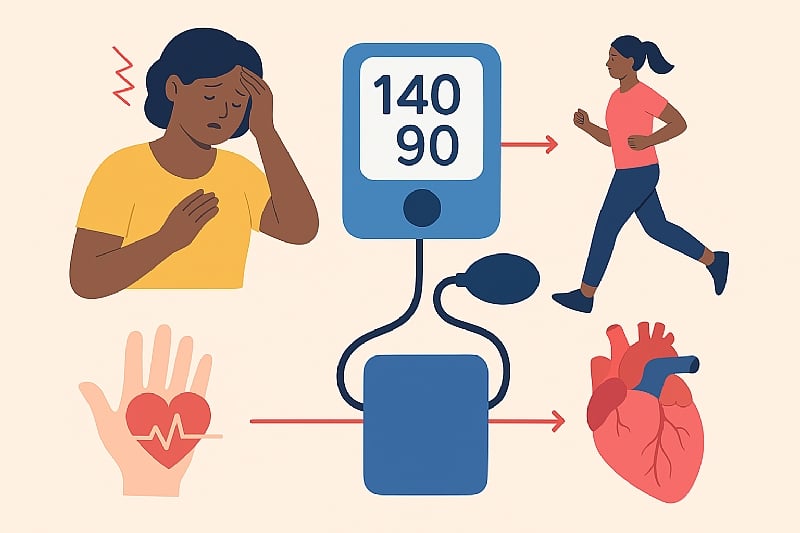Abi Davies, a 38-year-old mother of two, experienced a sudden and frightening episode of dizziness and weakness, a moment that unveiled a hidden health crisis: hypertension. What she initially dismissed as fatigue was, in fact, a dangerous elevation in blood pressure, a condition often dubbed the “silent killer” due to its asymptomatic nature. Prior to her diagnosis, Abi experienced a range of vague symptoms like body aches, anxiety, vocal weakness, and irritability, all of which she attributed to other causes. Her diagnosis underscored a common issue: many individuals overlook the subtle warnings signs of hypertension until a serious health event occurs. A family history of the condition, coupled with potential psychological stress, contributed to Abi’s diagnosis, highlighting the importance of recognizing risk factors and seeking medical attention.
The life-altering news of a chronic illness, particularly one requiring lifelong medication, can be devastating. Abi’s initial reaction was one of fear and uncertainty, grappling with the concept of managing a condition indefinitely. However, through counseling and a growing sense of faith, she gradually accepted her diagnosis and embraced the necessary lifestyle changes. This acceptance, coupled with a proactive approach to managing her health, became the foundation of her journey towards living a fulfilling life with hypertension. This transition, from fear and denial to acceptance and proactive management, is a crucial step for many individuals diagnosed with chronic conditions.
Abi’s journey towards managing her hypertension involved a period of self-discovery, learning to identify and avoid triggers that elevated her blood pressure. Regular exercise, particularly walking, emerged as a key element in controlling her blood pressure. She also discovered the impact of diet, recognizing that late-night eating and certain spices could negatively affect her blood pressure levels. Furthermore, Abi learned the critical role of managing stress and emotions in maintaining healthy blood pressure. Her experience underscores the importance of individualizing management strategies, as triggers and effective coping mechanisms can vary from person to person. Abi’s story highlights the empowering aspect of self-care in chronic disease management.
Abi’s experience mirrors a larger public health concern in Ghana, where hypertension affects a significant portion of the adult population. The Ghana Health Service estimates that one in three adults lives with hypertension, with a alarming number unaware of their condition. The Ghana STEPS Survey Report (2023) revealed concerning dietary habits, including high salt consumption and frequent consumption of processed foods, both of which contribute to the prevalence of hypertension. The report also identified a significant screening gap, with many individuals, particularly men, never having their blood pressure checked. This lack of awareness and proactive screening contributes to the “silent” nature of the disease, delaying diagnosis and increasing the risk of serious complications.
The underdiagnosis and undertreatment of hypertension paints a stark picture of the challenges faced in addressing this growing health crisis. Even among those diagnosed, the report indicated that a small percentage have their blood pressure adequately controlled. This highlights the need for improved access to healthcare, increased awareness about the importance of regular blood pressure checks, and better management strategies for those diagnosed. Health professionals emphasize the silent nature of hypertension, warning that it often remains undetected until it manifests as a life-threatening event like a stroke or heart attack. The rising prevalence of hypertension, often attributed to lifestyle factors like diet and stress, further emphasizes the need for comprehensive public health interventions.
The silent progression of hypertension underscores the urgent need for increased awareness and proactive management. Abi’s experience serves as a powerful reminder that early detection and adherence to treatment are essential for living a full and healthy life with hypertension. She advocates for regular blood pressure checks, emphasizing the importance of not waiting for symptoms to appear before seeking medical attention. Her message resonates with the broader public health message surrounding hypertension: early detection saves lives. The WHO’s global statistics further highlight the widespread nature of this condition, particularly in low- and middle-income countries. Experts call for a multi-faceted approach to combatting hypertension, including routine screenings, lifestyle modifications, and public education campaigns. The ultimate goal is to break the silence surrounding hypertension, empowering individuals to take control of their health and avoid the devastating consequences of this often-overlooked condition.














